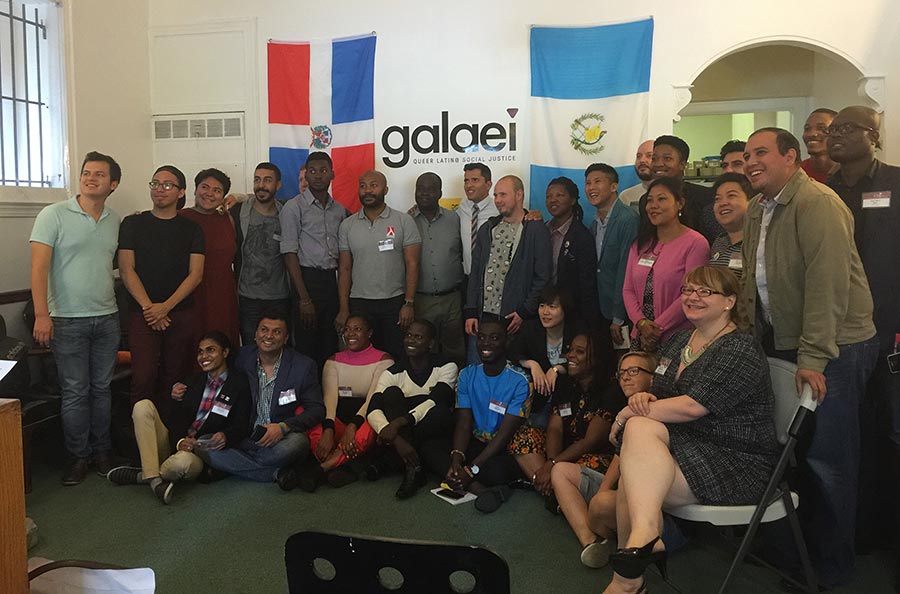LGBT leaders from Asia, Africa, South America and beyond filed into the emerald sala on the second floor of the North Philadelphia office of GALAEI: A Queer Latin@ Social Justice Organization.
The first person they heard about during their June 17 visit was Gloria Casarez, a former executive director of the organization and inaugural director of the Philadelphia Office of LGBT Affairs. She died in 2014.
Downstairs, they talked about the mass shooting at an Orlando LGBT nightclub. GALAEI had memorialized the 49 victims, many of whom had Puerto Rican roots, on a rainbow wall. The 25 global LGBT leaders stopped at GALAEI to learn about the needs of the LGBT Latinx community in Philadelphia, especially in the wake of Orlando.
“For us right now, it’s about healing,” said Fran Zavala Cortes, youth coordinator with GALAEI. “It’s about giving our community a space to speak.”
The LGBT leaders also met with local attorney Angela Giampolo and officials with the Mazzoni Center.
They were in Philadelphia last week as part of the International Visitor Leadership Program, an exchange program funded by the U.S. Department of State. An organization called Citizen Diplomacy International of Philadelphia lobbied for the LGBT group to visit the city during its three-week trip to the United States.
“We’ve got really phenomenal resources in our region,” said Lissa Morinsky, program officer with the citizen diplomacy organization. “It’s such an LGBT-friendly city.”
It’s the second time in four years that an LGBT group through the State Department’s exchange program has come to Philadelphia.
Among the objectives laid out for the group’s visit, the Department of State sought for them to examine LGBT-rights initiatives; explore diverse approaches to LGBT identities; learn about efforts to promote equal access to educational, economic and health-care opportunities; learn about partnerships designed to curb bias crime; explore current legislative and political affairs impacting LGBT people in the United States; and see firsthand the impact of LGBT organizations on the wider LGBT-rights movement.
During the LGBT leaders’ time at GALAEI, they were interested in sharing strategies for organizing. Many of the visitors worked for programs in their countries that received funding from the United States Agency for International Development.
Zavala Cortes said GALAEI has three main programs and two main funders. A program with the Philadelphia Foundation that receives donations from the Eagles and Phillies covers youth programs. The AIDS Activities Organizing Office, funded through the Centers for Disease Control and Prevention, supports HIV testing and the Trans-Health Information Project.
“It’s sometimes hard to think of long-term goals when your funding is only year-to-year,” Zavala Cortes said.
Alessandra Hereman, an activist from Guyana, said the life expectancy of a transgender person in the Caribbean is 30 years.
“I’m 23 now,” she said. “I tell my friends I could only have eight or nine more years. If they want me to live longer, they’re going to have to support me.”
Zavala Cortes said outreach to the local schools has proven pivotal to reaching people at a young age and promoting positive education around LGBT people. GALAEI developed an 80-page sexual-education curriculum with the help of students in the master of social work program at Widener University in Delaware County. Several of the global LGBT leaders asked to take copies of the curriculum back to their organizations.
Zavala Cortes said GALAEI focuses on relationships with individual schools, like El Centro de Estudiantes in North Philadelphia, versus meetings with district-wide officials.
“This was a great discussion,” Hereman said. “It provides an opportunity where we could talk about all these cross-continental issues.”

